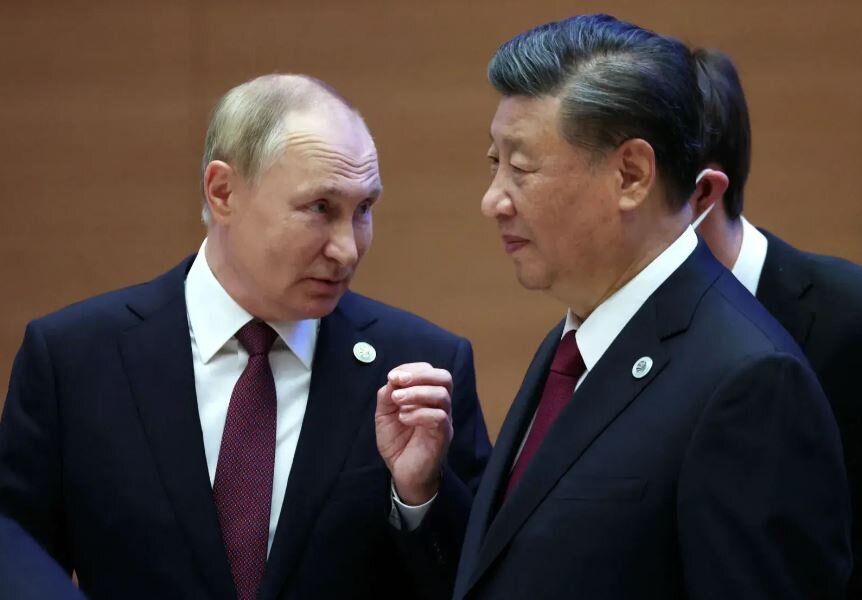US and Israel go after Iran's allies, showing no sign of de-escalation

TEHRAN – Israel and the United States are escalating their campaign of economic, military, and diplomatic coercion against Iran, focusing their efforts in recent days on undermining the two of the country's biggest allies, China and Russia, who provide economic, diplomatic, support against external threats, and could potentially offer Iran military aid in the future.
With US-Russia relations strained over the war in Ukraine, Israel took on the mission of influencing Russia. Israeli Prime Minister Benjamin Netanyahu held a telephone conversation with President Vladimir Putin on Monday. While Official readouts only mention discussions on Gaza and Iran's nuclear program, reports suggest Netanyahu's primary goal was to pressure Putin into halting support for Iran.
During its 12-day war with Israel in June, Iran did not request military aid from Russia and China, aiming to demonstrate to the regime and its American patron its capability to effectively defend itself, the Tehran Times understands. However, it is now believed that Tehran might seek certain military assets as it prepares for potential future Israeli-American aggression, particularly in areas where it previously identified deficiencies.
While Iran inflicted heavy and devastating damage on Israel and the U.S. during the war thanks to its formidable missiles, analysts suggest it needs to further enhance its air defense systems. Although it is not yet clear whether Iran has formally requested military aid, an official from Iran’s Air Defense Unit informed the Tehran Times that the country is rapidly rectifying its weaknesses.
Reports that describe Netanyahu’s engagement with Putin are conflicting. Some claim he used their prior close relationship to make a point, but others believe the Israeli war criminal threatened to bolster military support for Ukraine if Russia decided to help Iran.
“The relationship between Iran and Russia is one of strategic significance. The bilateral comprehensive pact that came into effect recently is quite telling of this fact,” said Ruhollah Modabber, a Russia expert. “I don’t believe Israel can disrupt this relationship. The Iran-Russia ties will not be altered by a third party.”
Putin later said that Israeli leaders had requested him to convey to Iran that they are not seeking further confrontation, and wish to ease tensions. “We continue confidence-based contacts with Israel and receive signals from Israeli leadership asking that this be conveyed to our Iranian friends that Israel intends and is determined to further resolve the issue, and is not interested in any form of confrontation,” he said while addressing the Central Asia-Russia summit in Dushanbe on Thursday.
China will take ‘necessary measures’ in response to US anti-Iran sanctions
The U.S. and Israel consistently employ a more heavy-handed approach when attempting to influence China, another of Iran's key allies. Likewise, The United States on Thursday imposed another round of sanctions against Iran’s oil sector, targeting 10 individuals, 49 companies, and 34 vessels accused of facilitating Tehran’s crude and petrochemical exports. Among them, Washington said, was an independent Chinese refinery and oil terminal allegedly involved in processing and transporting Iranian oil products.
Earlier on the same day, the U.S. Commerce Department also added 29 new entities—including 16 companies and three addresses in China, nine in Turkey, and eleven in the United Arab Emirates—to its restricted list, claiming they had supported Iran’s military programs.
At a press briefing in Beijing on Friday, Chinese Foreign Ministry Spokesperson Guo Jiakun said his country would act to protect its businesses from the impact of the new U.S. restrictions, which target a Chinese refinery and dozens of entities allegedly involved in trading Iranian oil.
“China urges the United States to stop using sanctions as a tool of pressure,” Guo said. “We will take all necessary steps to ensure the legitimate rights of Chinese companies and citizens are protected and to defend our energy security.”
This is the fourth round of sanctions under President Trump targeting Chinese refineries that continue purchasing Iranian oil.
Despite years of sanctions, Iran has maintained oil exports through alternative routes and by leveraging Asian buyers, particularly in China, which is its biggest customer. The U.S. is escalating its pressure campaign on Iran’s energy sector by targeting its global supply chains and maritime networks.
All this is part of the United States’ pressure campaign against Iran, including the reinstatement of sanctions under the so-called Snapback Mechanism, a settlement mechanism originally adopted to settle difference pertaining to the 2015 Iran nuclear deal known as the Joint Comprehensive Plan of Action (JCPOA).
Under the JCPOA, Iran accepted restrictions on its nuclear activities in exchange for the lifting of international sanctions. The deal was endorsed by UN Security Council Resolution 2231, which set October 2025 as the deadline for the final expiration of all nuclear-related measures.
Iran has consistently argued that the U.S., even under the Obama administration, failed to uphold its side of the agreement by obstructing Tehran’s access to economic benefits. The situation deteriorated further in 2018 when the Trump administration unilaterally withdrew from the JCPOA and reimposed sweeping sanctions.
In response, and after waiting over a year for Europe to fulfill its commitments, Iran began gradually reducing its obligations under the deal while maintaining that its actions were reversible and within the legal framework of the JCPOA.
The October 2025 deadline was meant to mark the end of the decade-long nuclear dispute and the normalization of Iran’s nuclear status. However, the E3’s decision to trigger the snapback mechanism effectively blocks that process.
Iran maintains that its reduced commitments were legitimate countermeasures to Western non-compliance, and therefore, the E3 has no legal grounds to activate the mechanism. Russia, China, and several other countries have endorsed Iran’s position, saying they do not recognize the legitimacy of the renewed anti-Iran sanctions.
